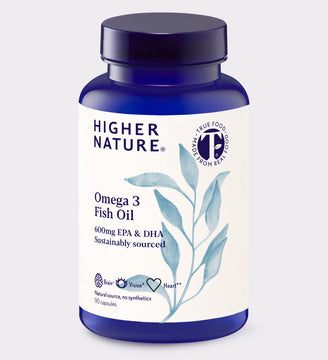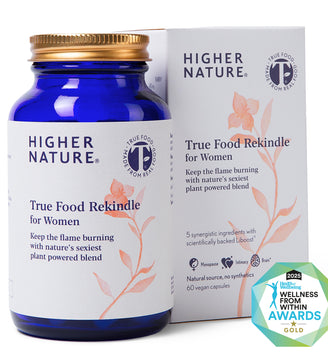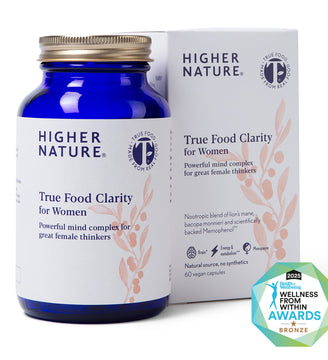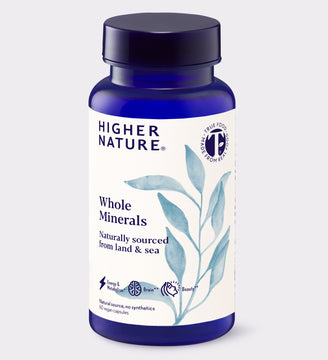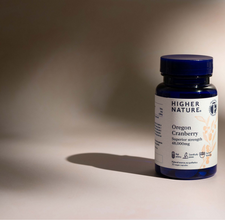
Allergies - Zing into Spring!
Higher Nature Nutrition Team
Spring, a time of new beginnings, is when we finally see the end of the cold dark winter and look forward to long hot summer days. Whilst most people welcome warmer weather, for others spring means the start of the allergy season. According to the British Allergy Foundation, approximately one in four of the UK population will suffer from an allergy at some point in their lives, and the number of people affected is increasing by 5% each year.
Hay fever
Hay fever is one of the most common allergies in the UK. Also known as seasonal allergic rhinitis, hay fever, is an allergic reaction to airborne substances, such as pollen, that gets into the upper respiratory passages - the nose, sinus, throat - and also the eyes. The type of pollen that causes hay fever is typically connected to where the sufferer lives. In the UK, most hay fever is caused by grass pollen, while in Scandinavia it is mostly birch pollen and in southern Spain, olive pollen. The pollen that enters the bloodstream through the tissues of the throat, lungs and gut, is regarded by our immune system as foreign, and in defence the body produces antibodies, mostly binding to mast cells, which in turn release histamine. Histamine irritates the upper respiratory passages, causing swelling and inflammation that produce the typical hay fever symptoms, including, itchy and watery eyes, a bunged up or runny nose, frequent sneezing and coughing. Many people resort to taking anti-histamines, which may offer some relief but can cause drowsiness and other side effects.
Hay fever, eczema, and asthma are linked together. A sufferer of one is very likely to suffer from the other two as well and the tendency to allergies frequently runs in families.
Eczema
Eczema, also called atopic dermatitis is not an allergy but can be triggered by one. The term eczema refers to a number of different skin conditions in which the skin is red or irritated and occasionally results in small, fluid-filled bumps that become moist and ooze. Eczema may affect any area, but it classically appears on the arms and behind the knees. It tends to flare periodically and then subside. The exact cause of eczema is unknown, but certain factors such as stress, low nutrient status, poor digestion, hereditary factors, and a low immune system may be contributing factors.
Asthma
Asthma is an inflammatory disorder of the bronchial tubes or airways. When we breathe normally, air is taken in through the nose or mouth and then goes into the windpipe, passing through the bronchial tubes, into the lungs, and finally back out again. Asthma sufferers have airways that are inflamed, which cause swelling and the production of thick mucus leading to a narrowing of the airway. This makes it difficult for air to move through, leading to the symptoms of asthma such as shortness of breath, chest tightness, wheezing and coughing. Typical triggers for an asthma attack can include cold air, colds, smoke and airborne allergens such as pollen.
So, in the same way that you get the sudden urge to remove the clutter from your house and clean it from top to bottom, why not consider giving your body a spring-clean too? By supporting your digestive, respiratory, skin and immune health with the appropriate dietary measures, together with supplemental support, you stand the best chance of managing unwanted allergic symptoms as well as giving you a new burst of vitality.
Try the following:
-
Probiotics
Friendly bacteria play an important role in digestive and immune health. Cleanse - Consider taking culinary herbs, in supplement form or added to cooking, such as Dandelion root, Burdock root, Chicory root, Parsley leaf, and Garlic to help support the liver and cleanse the body.
Foods such as gluten, citrus and dairy may trigger allergic reactions. A food intolerance test can help you to identify any problem foods. Allergy sufferers may also find it helpful to avoid large amounts of foods that are naturally high in histamine such as shellfish, matured cheese, spinach, chocolate and strawberries.
The salty atmospheres of salt mines have been used for centuries to ease the symptoms of respiratory system disorders. Regular use of a salt pipe may help you breathe more easily and cleanse the respiratory system.
-
Increase fruit and vegetables
Fruit and vegetables are an excellent source of vitamin C, the major antioxidant present in the lining of the respiratory tract. Vitamin C also helps to maintain a healthy immune system. People with low levels of vitamin C appear to produce higher levels of histamine.
-
Magnesium
Magnesium may help to maintain healthy airways and is found naturally in wholegrains, green leafy vegetables, nuts, and seeds. It is also available in food form supplements.
-
Essential Fatty Acids
Oily fish such as salmon, mackerel and sardines are a good source of omega-3 essential fatty acids. These essential fatty acids have anti-inflammatory properties and help to promote healthy skin. Fish oil supplements are also available which some people find more convenient to take. Hemp seed oil is an especially rich source of omega-6 fatty acids. A study, published in the Journal of Dermatological Treatment by Finnish scientists, suggests that regular consumption of hemp seed oil may benefit eczema sufferers.
-
Quercetin and Bromelain
The bioflavonoid Quercetin found naturally in onions, citrus fruits and apples, works synergistically with vitamin C to help support immunity. The enzyme Bromelain found in pineapple aids the absorption of Quercetin as well as having anti-inflammatory properties. Bromelain also has the ability to break down proteins and may help to disperse the mucus associated with allergic reactions. Together both Quercetin and Bromelain help support immunity especially in those prone to allergies such as hayfever.
-
Avoid Trigger Foods
Foods such as gluten, citrus and dairy may trigger allergic reactions. A food intolerance test can help you to identify any problem foods. Allergy sufferers may also find it helpful to avoid large amounts of foods that are naturally high in histamine such as shellfish, matured cheese, spinach, chocolate and strawberries.
-
Salt Pipe
The salty atmospheres of salt mines have been used for centuries to ease the symptoms of respiratory system disorders. Regular use of a salt pipe may help you breathe more easily and cleanse the respiratory system.


